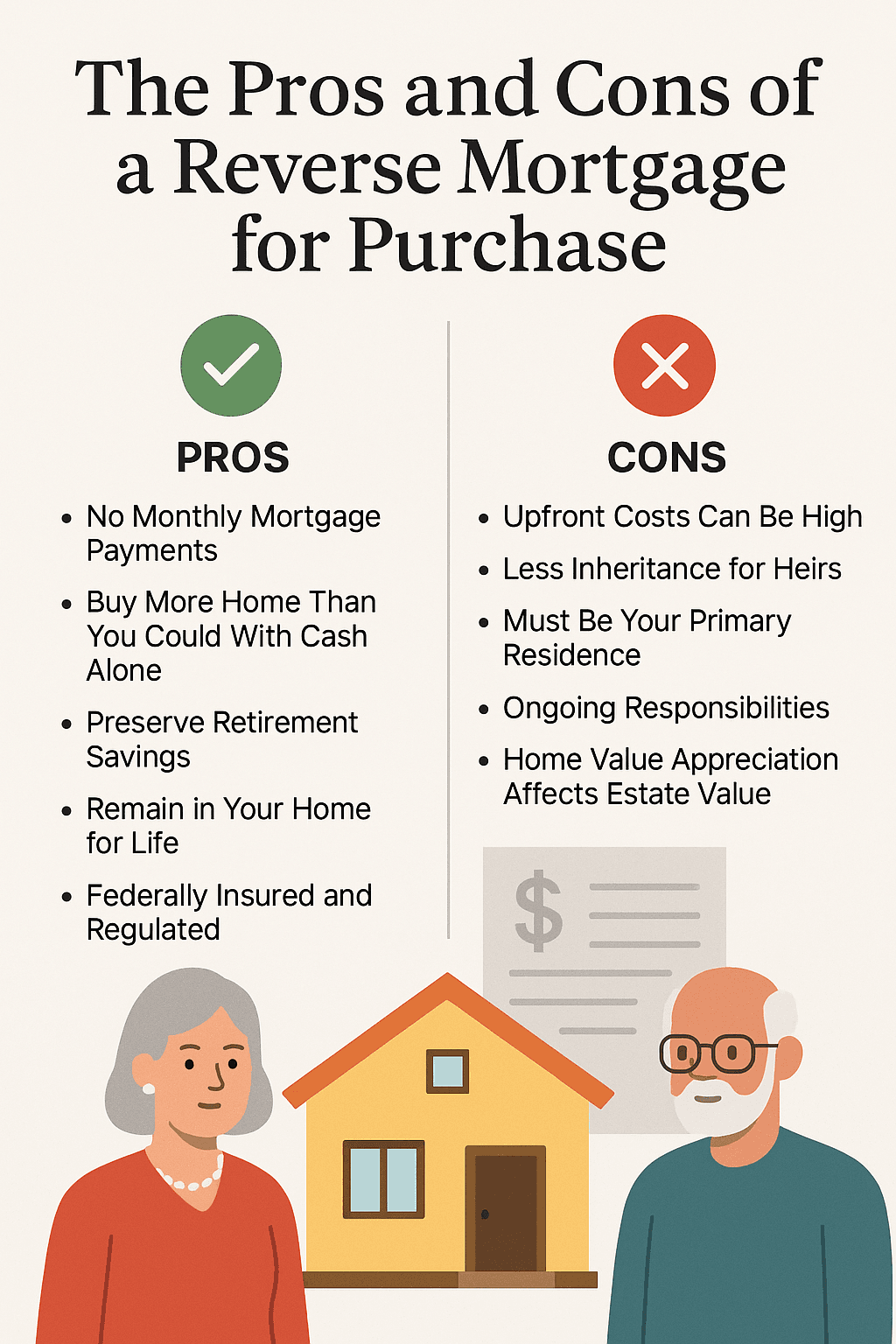The Pros and Cons of a Reverse Mortgage for Purchase: Is It the Right Move for You?
If you're 62 or older and looking to buy a new home, you might be surprised to learn that you don’t need to pay all cash—or take on a traditional monthly mortgage payment. Instead, a reverse mortgage for purchase, also known as a HECM for Purchase (Home Equity Conversion Mortgage), can help you finance part of the home's purchase price while eliminating monthly principal and interest payments.But like any financial product, it comes with both benefits and drawbacks. Here’s what you need to know before deciding if it’s right for you.

✅ Pros of a Reverse Mortgage for Purchase
1. No Monthly Mortgage Payments
One of the biggest advantages is that you won’t have to make monthly principal and interest payments. This can free up cash flow in retirement for other needs or lifestyle goals. (Note: You’ll still need to pay property taxes, homeowners insurance, HOA dues if applicable, and keep up with home maintenance.)
2. Buy More Home Than You Could With Cash Alone
With a reverse mortgage, you only need to put down a portion of the purchase price—typically 45% to 60%, depending on your age and interest rates. This can allow you to purchase a more expensive home than you'd be able to afford using only your liquid assets.
3. Preserve Retirement Savings
Instead of tying up all your cash in the home, you can keep some funds invested or in reserve for medical needs, travel, or leaving a legacy.
4. Remain in Your Home for Life
As long as you live in the home as your primary residence and meet loan obligations, you cannot be forced to move out, even if the loan balance grows to exceed the home’s value
.
5. Federally Insured and Regulated
HECM loans are insured by the FHA, offering consumer protections such as non-recourse terms (you or your heirs never owe more than the home’s value at sale).
❌ Cons of a Reverse Mortgage for Purchase
1. Upfront Costs Can Be High
Closing costs are typically higher than a traditional mortgage and include FHA mortgage insurance premiums, which are paid upfront and annually. These fees are usually rolled into the loan but reduce your available equity.
2. Less Inheritance for Heirs
A reverse mortgage reduces your home equity over time. If leaving the home free and clear to heirs is a top priority, this could be a disadvantage.
3. Must Be Your Primary Residence
You must live in the home as your primary residence. Vacating it for more than 12 consecutive months (e.g., moving into assisted living) can trigger repayment.
4. Ongoing Responsibilities
You’re still responsible for taxes, insurance, and maintaining the home. Failure to do so can lead to default.
5. Home Value Appreciation Affects Estate Value
If the home does not appreciate as expected, there may be little equity left for heirs. While the FHA insurance protects against negative equity, it doesn't guarantee a profit.
Is It Right for You?
A reverse mortgage for purchase can be a powerful tool for retirees who want to right-size their home, improve cash flow, and preserve savings. It’s especially appealing to buyers who want to avoid tying up most of their retirement funds in a home purchase. But it's not for everyone. It’s important to weigh your goals, health outlook, and estate planning priorities.
As always, consult with a qualified reverse mortgage specialist or financial advisor to see if this option makes sense for your situation.
✅ Reverse Mortgage for Purchase – Minimum Qualifying Criteria Checklist
🏡 Borrower Eligibility
- Age 62 or older (at least one borrower must be 62+)
- U.S. citizen or legal permanent resident
- Primary residence – must intend to live in the home as your primary residence
- No delinquent federal debt (e.g., taxes, student loans, SBA loans)
- Ability to maintain the home – willing and able to pay:
- Property taxes
- Homeowners insurance
- HOA fees (if applicable)
- General home maintenance and repairs
📄 Financial Assessment
- Sufficient income or assets to cover ongoing property charges
- Satisfactory credit history – no major derogatory credit or recent foreclosures
- Residual income meets HUD guidelines after accounting for household expenses
- May require a Life Expectancy Set-Aside (LESA) if financial assessment indicates risk
🏠 Property Requirements
- Eligible property type:
- Single-family home
- 2- to 4-unit home (if one unit is owner-occupied)
- FHA-approved condo
- Manufactured home (must meet HUD standards and be on a permanent foundation)
- Property must pass FHA appraisal and meet safety standards
- New home must be completed and move-in ready at closing (no construction loans)
💵 Down Payment Requirements
- Down payment based on age of youngest borrower and interest rates
- Typically ~67-74% of the home’s purchase price
- Must come from allowed sources (sale of current home, savings, gifts – no borrowed funds)
📑 Program Requirements
- HUD counseling completed with a HECM-certified counselor before application
- Must occupy the home within 60 days of closing
- No current FHA mortgage on a different property
- Property must be purchased from an independent third-party seller
Purchase a Home
Whether you're buying your first home or your dream home, we have a mortgage solution for you. Get your custom rate quote today.
Refinance your Home
We're committed to helping you refinance with the lowest rates and fees in the industry today. Getting started is quick and easy.
Apply Today
Our secure application is a few quick questions that takes about 7-10 minutes to complete and is required for a “Pre-Approval”. Get started today!